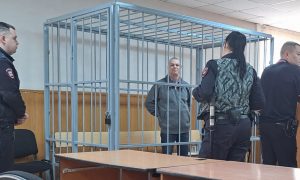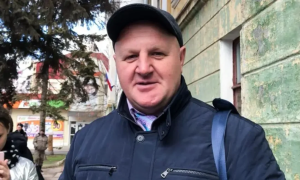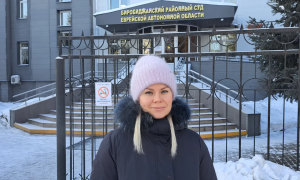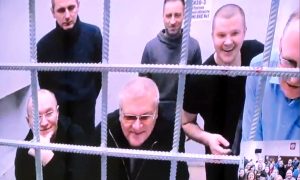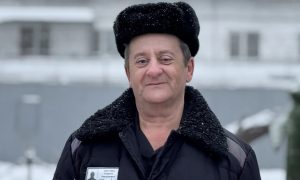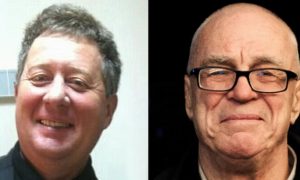| 13:15 |
The courtroom of the Supreme Court is gradually filled with listeners. Feelings of difficulty with restrained excitement. The parties are deliberately preparing to speak in the debate. |
|---|---|
| 13:50 | Most of the seats in the hall are already occupied. |
| 14:09 | Hearings begin. Omelchenko declares a short petition on the attachment of the European Union statement on the persecution of Jehovah’s Witnesses in Russia. In it, the European Union says that “the statement of March 15, filed by the Ministry of Justice of the Russian Federation in the Supreme Court, is the last severe measure taken in the fight against Jehovah’s Witnesses and the further increase in violations of their rights and prosecutions they are subjected to in Russia, that Contradicts international standards in the field of freedom of religion or belief. “ The court clarifies how this statement can affect the outcome of today’s hearing. Omelchenko says that this is evidence of a violation of Art. 18 of the European Convention. Although the European Union is not a body of the Council of Europe, it is made at a meeting of the Council of Europe. The court refuses to attach the document. |
| 14:15 | The court proceeds to debate. Statement by the representative of the Ministry of Justice. |
| 14:16 | The Ministry of Justice draws attention to the fact that Russia adheres to the principle of the rule of law. The law on freedom of conscience provides a framework. The Ministry of Justice draws attention to the fact that the very name of the Center, the “Administrative Center for Jehovah’s Witnesses in Russia,” indicates that the centralized organization exercises control over the LROs. The Ministry of Justice draws attention to the leading role of the CA in interaction with the MPO. The UC agrees on the issues related to the appointment of the chairmen of the LROs, etc. Organizations of Jehovah’s Witnesses are a holistic organism. They are characterized by organizational unity. References to the canonical connection of the Ministry of Justice are inconclusive. |
| 14:25 | According to the representative of the Ministry of Justice, the fact that the defendant continues to declare about the landings shows that the UC does not repent of extremist activity. |
| 14:28 | The representative of the Ministry of Justice: although many religions express some relation to secular authorities, the texts of Jehovah’s Witnesses contain impermissible insulting ways of expressing the truth of their beliefs. Extremists recognize not the quotation of the Bible, but the interpretation of what is written in the Bible. |
| 14:35 | The Ministry of Justice believes that the wide coverage of court decisions on the recognition of materials as extremist gave the UC all the opportunities not to import literature into the country that would fall under the courts’ argument on what to regard as extremist activity. |
| 14:35 | On the gross violation of anti-extremist legislation, according to the Ministry of Justice, says the fact that the Center for 25 years imported materials that were later recognized as extremist. |
| 14:38 | The Ministry of Justice considers cynicism the fact that in the literature of Jehovah’s Witnesses the word “extremist” (with reference to the literature of Jehovah’s Witnesses) is quoted – despite the fact that the courts’ decisions to recognize extremist literature have entered into legal force. |
| 14:40 | Summing up, the representative of the Ministry of Justice, as before, asks to liquidate the UC and all MROs of Jehovah’s Witnesses, to confiscate their property and all this – without waiting for the court’s entry into legal force. |
| 14:42 |
Speech in the debate begins the representative of the administrative defendant Omelchenko.
|
| 14:45 | Omelchenko analyzes the non-legal nature of the generalization made by the Ministry of Justice, that various organizations of Jehovah’s Witnesses are supposed to be a single organization “with structural subdivisions”. |
| 14:50 | Omelchenko cites the norms of legislation on countering extremism. The law does not provide for such extremist acts as “an act in the form of inaction”, “an act committed inadvertently, by negligence”. The Supreme Court of Russia has repeatedly pointed out that extremism can only be active actions aimed at violent change of the foundations of the constitutional system. |
| 15:02 |
The representative of the plaintiff, according to Omelchenko, gave in the debate some sort of own interpretation of what extremism is. However, the defendant recalls that the Supreme Court and the Constitutional Court of the Russian Federation give legal interpretation. And these courts ruled that “inciting hatred and propaganda of social, racial, national, religious superiority, whose existence should be determined taking into account all the significant circumstances of each particular case , namely the form and content of activities or information, their addressees and the target orientation , The socio-political context, the existence of a real threat , including including calls for unlawful attacks on constitutionally protected values, justification for silt And the justification of their commission. “ “Restriction through the anti-extremist legislation of freedom of conscience and religion, freedom of speech and the right to disseminate information should not take place in relation to any activity or information on the sole ground that they do not fit into generally accepted notions, do not accord with established traditional views and opinions , Come into conflict with moral or moral or religious preferences. Anything else would mean a departure from the constitutional requirement of necessity, proportionality and justice of restrictions on the rights and freedoms of man and citizen. “ |
| 15:13 |
Omelchenko: The actions of the Ministry of Justice do not pursue a legitimate aim, they bear all signs of political repression. “I ask to satisfy the demands of the administrative plaintiff completely.” |
| 15:16 | In the debate advocates advocate Zhenkov. He begins with the personal impression of the last days. He found himself in one of Moscow’s parks and saw that dozens of Jehovah’s Witnesses came to this park. They did not have any posters and they did not come out to protest the lawsuit that began in the Supreme Court on April 5, 2017. They went out to clean up the garbage that had accumulated over the winter. So who are these people? Extremists or good Christians? |
| 15:20 | The Ministry of Justice demands to select all the buildings of worship of Jehovah’s Witnesses in Russia, built by believers at their own expense. This happened only once in Russia, namely, a hundred years ago, in 1918. Then the decree of the Council of People’s Commissars was taken away all property, including liturgical buildings, the Russian Orthodox Church. |
| 15:27 | Zhenkov: The Ministry of Justice suggested that Jehovah’s Witnesses, from despair, say that the cases against them are falsified. However, believers do not despair, notes Zhenkov. They believe the words of the Bible that there is nothing secret that would not become obvious. And everyone will bear responsibility before God for their deeds. Just the other day, on April 17, 2017, the President of the Russian Federation approved an amendment to Art. 303 of the Criminal Code of the Russian Federation, criminal responsibility for falsifying evidence on administrative cases is now provided. However, the problem of falsifications should concern not only the President, but above all the executive bodies, such as the Ministry of Justice (justice in Latin means justice). |
| 15:35 | In the case there are dozens of certificates: gratitude not only for the improvement of the territory, but for an active life position, for helping those affected by natural disasters, for helping IDPs from the territory of Ukraine, for helping the children’s home, for improving the leisure center for children with disabilities, for Participate in the marathon “Help the child”, etc. “Is it so that the organization is both useful and dangerous?” Zhenkov is perplexed. |
| 15:40 | Females analyze the testimony of witnesses, both from the plaintiff’s side and from the defendant’s side. |
| 15:45 | The lawyer draws attention to expert opinions on the literature of Jehovah’s Witnesses. “Why do I stop at literature again? Because literature, recognized as extremist, is the only complaint against Jehovah’s Witnesses in carrying out extremist activities. “ |
| 15:46 |
Zhenkov: “This room was attended by a man who was born in prison. Because his mother was sentenced on 5 month of pregnancy as an enemy of the people to 8 years of imprisonment just because she was a Witness of Jehovah. She gave birth in prison, and spent two years in a prison orphanage. His father could not take him, because he was exiled to Siberia. In 1991, the state recognized the mother as a victim of political repression, apologized to her, appointed a pension. And here in court this person, who was born in prison, approached me and asked: “Does the Ministry of Justice wish to repeat this terrible story?”. And I did not know what to say. I still do not know what moves the representatives of the Ministry of Justice and those who direct this process. “ |
| 15:50 |
Zhenkov: “What will happen if the court satisfies the request of the Ministry of Justice? A respected court, if this is the will of the state, then the country successfully acquires 170 thousand prisoners of conscience and a corresponding reputation. If the state’s will is to observe the law, then the court’s decision can be only one – to refuse to satisfy the Ministry of Justice in satisfying the administrative claim. “ |
| 15:52 | Speech in the debate begins representative of the defendant Toporov. “Accusing Jehovah’s Witnesses of extremism is like accusing extremism of an infant. Only an infant is not able to commit extremist activity because of his age, and Jehovah’s Witnesses are due to his religious worldview. For them, calls for any kind of violence against people, violent actions, enmity and hatred towards people by any indication are serious sins against God. “ |
| 16:02 | Speaking about the independence of the LRO, Toporov refers to the charter of the UC. MPOs are endowed with the absolute right, without taking into account the will of the Management Center, to determine the term of their presence in the said structure, to resolve issues of liquidation, transfer to other centralized religious organizations, etc. “The UC does not have the right to liquidate the MPO, it is not their founder … What is this structural unit?” – asks Toporov. |
| 16:12 |
Concluding his speech, Toporov cites entirely the statement of human rights activist L. Alekseeva. In the end, he says: “You, the respected court, it is you who, here and today, can eliminate injustice and dishonesty towards hundreds of thousands of Russian citizens, restore their good name, build confidence in the law on countering extremism, clearly showing the difference between these extremists and Extremists drawn on paper. We hope that the court will have the courage to do this and make a fair and impartial decision, guided by the law and the gift from God – a human conscience. “ |
| 16:13 | Speech in the debate begins the representative Novakov. He draws attention to the fact that due to the suspension of activities, believers throughout the country were subjected to massive violations of rights: law enforcement officers intervened at divine services and copied personal data of citizens who had not committed any offense. The police officers carried out illegal detention, delivery to the police, personal search, videotaping of persons. Administrative cases are raised, warnings are made about the possibility of criminal prosecution under Art. 282 of the Criminal Code. |
| 16:16 | Referring to the increasing violations of rights, Novakov says: “Moreover, if the Court makes a decision on liquidation, this will produce even more tragic consequences throughout the country. Any Jehovah’s Witness may be considered an extremist with all the ensuing consequences: widespread religious violence against Witnesses: from destruction and damage to property and attacks, to causing serious harm to health and killing peaceful religious citizens on the grounds of religious hatred. At any international level, blame for the connivance of violence and prosecution for far-fetched circumstances will be vested in state authorities in Russia. “ |
| 16:32 |
Novakov recalls that the representative of the Ministry of Justice accused Jehovah’s Witnesses in cynicism in his debates. “I’ll tell you what cynicism is,” Novakov said. When the Ministry of Justice in the court on an MPO first says that the rights of the CA are not affected, and then these decisions are presented as the basis for eliminating the CA. Or when the Ministry of Justice perceives much more harsh statements against Jehovah’s Witnesses as “ordinary criticism”, while calling “extremism” those statements that are far from extremism. When, contrary to the available data, the Ministry of Justice dismisses reports of falsification, it does not dare to cite cases when falsification is clearly fixed on the video. “That’s what cynicism is!” Concludes Novakov. |
| 16:40 | Speech in the debate begins a representative of Cherepanov. He believes that if the court leaves Jehovah’s Witnesses in the legal field, Russia will not only not suffer damage, but on the contrary will improve its reputation both inside the country and on the international arena. Decisions against Jehovah’s Witnesses have been appealed to the ECHR and the UN Human Rights Committee. |
| 16:45 | “We have had good cooperation with the Justice Ministry for decades,” said Cherepanov. “I think the Justice Ministry should feel in a sense our defender, he registered us!” Addressing to the representatives of the Ministry of Justice, Cherepanov said: “Let’s be friends! Do not become a punitive body. We do not want to sue you, we ask that you help us, and do not look for a reason to close us. “ |
| 16:47 | Cherepanov speaks about the problem of denigrating the good name of Jehovah’s Witnesses in the media. Attributed to various atrocities, for example, “weaning apartments.” Proving the falsity of this myth, Cherepanov recalls the biblical commandment “Do not covet someone else’s”. |
| 16:50 |
“The strength of a powerful state is precisely to protect the interests of the minority, because the majority will stand for itself.” |
| 16:55 | The representative of the defendant Kalin is speaking: “The Ministry of Justice not only humiliates itself and its functions, but humiliates the entire state in the eyes of the international community. If a respected representative of the Ministry of Justice has personal convictions that Jehovah’s Witnesses are extremists, I’m very sorry. If the representative of the Ministry of Justice was a victim of the circumstances in which he fell into, and is forced to perform just the role of accuser, I am also sorry. But in either case you will have to answer before your own conscience. “ |
| 16:56 |
Kalin recalls responsibility before God and says: “I take this opportunity to issue a warning to the Prosecutor General’s Office and the Ministry of Justice. Please, come to your senses! Please, come to your senses! “ |
| 5pm | The parties exchange replicas. |
| 17:01 | The representative of the Ministry of Justice recalls that the essence of the claim is to liquidate the legal entity, the Justice Ministry does not make claims against individuals. The Justice Ministry reminds the court of the testimony of one of the witnesses of the plaintiff who was expelled from the religious community. The Ministry of Justice considers this a violation of the rights of citizens. In response, Zhenkov recalls that at one time the Russian Orthodox Church excommunicated the writer L. Tolstoy. In our time, the ROC refused to cancel the decision on excommunication, despite petitions for this. This is an internal matter of the church. Zhenkov asks whether the Ministry of Justice intends to present any demands to the ROC. |
| 17:09 | The court is removed to the advisory room. |
| 17:18 | The hall is filled with television journalists. |
| 18:25 | The court is still in the advisory room. The hall awaits the announcement of the judicial act. |
| 18:50 |
The Supreme Court decided to liquidate the centralized religious organization of Jehovah’s Witnesses in Russia, as well as all 395 local religious organizations of this religion. Believers have already begun to prepare a complaint to the appellate instance (the panel consisting of three judges of the Supreme Court), which should be considered within a month. |
- Saturday
- February 14th, 2026
 Â
 